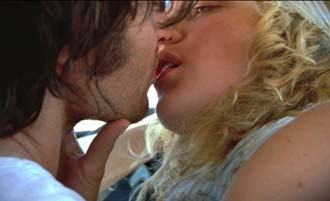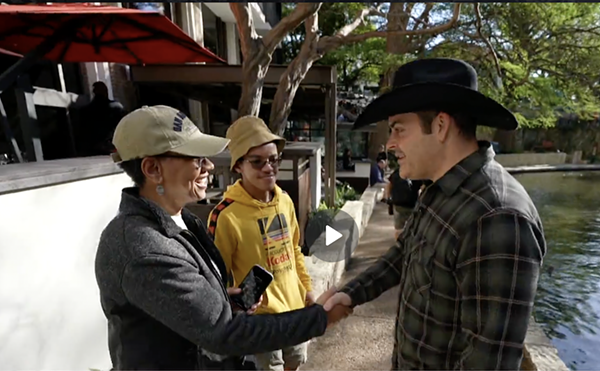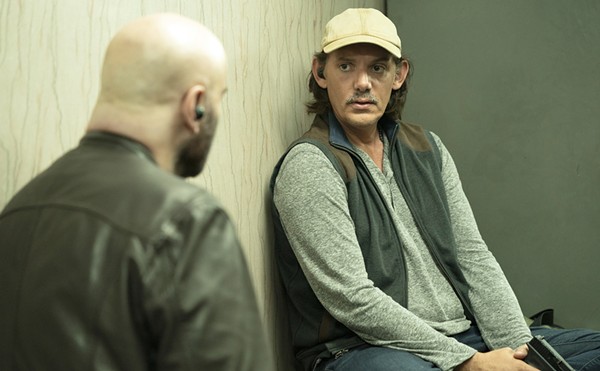|
Vincent Gallo's 'Brown Bunny' is an excruciating elegy I squirmed more than once while watching Vincent Gallo's Brown Bunny, now famous for being booed at Cannes: early on from anticipated boredom but later, surprisingly, from anguish for the fate of its two main characters. The film begins almost off-handedly at a motorcycle racetrack, where Bud Clay's anti-climactic laps herald his character's long dark nights in the grip of anger and denial. As he travels west for another race in southern California, we spend a week in and near Bud's van, experiencing the sensations of a long road trip: ennui, irritation, frustration. The story unfolds haltingly, and we intuit as much as hear that Bud is mourning the loss of his relationship with Daisy, his childhood sweetheart with whom he lived in Los Angeles. A truncated visit with Daisy's Alzheimer-addled parents leaves us with a handful of clues: a lost pregnancy, an abandoned pet rabbit, a daughter who doesn't call. In the quiet between Bud's brief encounters with women bearing more exotic flower names - Rose, Violet, and Lilly, who can't crowd out the memories of his simple Daisy - Gallo builds a true sense of grief. This is a small triumph for a film whose cinematography and acting will delight Dogme95 fans, and whose dialogue makes David Mamet sound verbose. Brown Bunny's gritty stoicism owes much to '70s-era films such as Five Easy Pieces, in which Nicholson plays an enigmatic and angry musical protégé who is slumming it as a roughneck in Texas (sometimes grainy film, Mary Tyler Moore outfits, and a soundtrack that includes Gordon Lightfoot amplify the feeling). But where Nicholson's Robert Eroica Duprea smolders and ultimately explodes as he repudiates his past, Gallo's Bud Clay quietly crumbles. His voice is soft, almost feminine, and he pleads - to be redeemed, to change the past, to forget. ("Please" is probably the most frequently spoken word in the sparse script.) Gallo performs with the magnetism of a black hole, drawing in close objects before they realize he's even present. He ultimately carries the film, with help from Chloë Sevigny, who is vulnerable and infuriating as Daisy, a self-aware addict who is simultaneously accusatory and remorseful.
Word on the street is that the film is terrible and if you go to see it at all, it might be out of curiosity over the oral sex scene that has supposedly shocked even French audiences. The moment is graphic and painfully intimate, but in the arc of the story it makes perfect sense. It plays on the power dynamic inherent in blow jobs, and as part of Bud's grief catharsis it speaks directly to his impotence, his failure to act in a pivotal moment, that cost him Daisy and the child she was carrying. The title's bunny has, up to this point, represented Bud's effort to grasp the brevity of his life with Daisy, but for Bud and Daisy it is also a powerful symbol of an implied promise he broke: that he loved her enough to never turn his back on her failings. In the end Gallo delivers a multi-layered film that mourns human weakness in its many forms, from addiction to self-loathing. I thought often of Sinead O'Connor's Tiny Grief Song during Brown Bunny. O'Connor's simple tune is a chant for tranquility. Gallo has made a tiny grief film that cries for release. • By Elaine Wolff
|
Tags:

KEEP SA CURRENT!
Since 1986, the SA Current has served as the free, independent voice of San Antonio, and we want to keep it that way.
Becoming an SA Current Supporter for as little as $5 a month allows us to continue offering readers access to our coverage of local news, food, nightlife, events, and culture with no paywalls.
Scroll to read more Movie Reviews & News articles
Newsletters
Join SA Current Newsletters
Subscribe now to get the latest news delivered right to your inbox.














